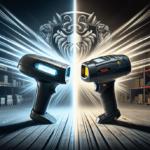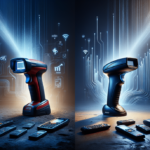Honeywell Granit 1911i vs Zebra DS8178: An In-Depth Comparison
Barcodes are integral to the efficiency of modern businesses, serving as the backbone for inventory management, sales tracking, and logistics. Selecting the right barcode scanner is crucial for optimizing these processes. Two leading options in the market are the Honeywell Granit 1911i and the Zebra DS8178. Both scanners offer robust performance and a range of advanced features tailored to different business needs. This comprehensive comparison delves into their specifications, performance metrics, and suitability across various industries to help you make an informed decision.
Product Overview and Features
Honeywell Granit 1911i
The Honeywell Granit 1911i is a wireless, industrial-grade scanner designed to read both 1D and 2D barcodes from significant distances. Equipped with Adaptus Imaging Technology, it can scan barcodes from mobile phone screens and other reflective surfaces. Its rugged construction ensures durability, withstanding multiple drops from up to 6.5 feet and operating in extreme temperatures.
- Wireless Connectivity: Utilizes a proprietary wireless protocol for reliable and secure communication.
- Rugged Design: Constructed to ISO/IEC standards for durability, capable of withstanding harsh conditions.
- Adaptus Imaging Technology: Enables the scanning of barcodes from mobile devices and other shiny surfaces.
- Long Battery Life: Offers up to 14 hours of continuous use on a single charge.
- Extended Reading Range: Capable of reading barcodes from distances up to 60 feet.
- Multiple Barcode Scanning: Can scan up to 20 barcodes simultaneously, enhancing efficiency.
Zebra DS8178
The Zebra DS8178 offers similar barcode scanning capabilities but adds features like Bluetooth connectivity and RFID compatibility. Its sleek and ergonomic design makes it lightweight and easy to handle, suitable for environments that require frequent and rapid scanning. The DS8178 is also built to endure harsh conditions, resisting water and dust, and can survive drops from up to 6 feet.
- Wireless Connectivity: Features Bluetooth for seamless pairing with multiple devices.
- RFID Compatibility: Enables the reading of RFID tags alongside traditional barcodes.
- Rugged Construction: Built to withstand drops and resist water and dust, ensuring longevity in tough environments.
- Extended Battery Life: Provides up to 24 hours of operation on a single charge.
- Reading Range: Effective at reading barcodes from distances up to 30 feet.
- Simultaneous Scanning: Capable of scanning up to 20 barcodes at once, speeding up processing times.
Design and Performance
Build Quality and Durability
Both scanners feature robust constructions designed for industrial use. The Honeywell Granit 1911i has a larger, more rugged body to resist harsh environments, accommodating a longer reading range and enhanced durability. In contrast, the Zebra DS8178 boasts a sleeker and lighter design, making it more maneuverable and comfortable for extended use. Both models meet IP65 sealing standards to protect against dust and water ingress.
Performance Metrics
According to industry benchmarks, the Zebra DS8178 demonstrates faster scanning speeds, particularly in high-volume settings, whereas the Honeywell Granit 1911i excels in environments requiring long-range scanning and resistance to environmental factors. The DS8178's RFID capabilities also allow for multi-data capture, streamlining inventory processes.
Connectivity and Battery Life
Wireless Connectivity
Wireless connectivity is a pivotal feature in modern barcode scanners, and both models offer distinct advantages:
- Honeywell Granit 1911i: Uses a proprietary wireless protocol that ensures a stable connection with a range of up to 300 feet, suitable for expansive warehouse or outdoor settings. However, it supports pairing with only one device at a time.
- Zebra DS8178: Utilizes Bluetooth technology, allowing simultaneous pairing with up to eight devices and a connectivity range of up to 100 feet. This makes it ideal for environments with multiple users and devices.
Battery Performance
Battery life is a critical factor, especially for operations that run continuously:
- Honeywell Granit 1911i: Offers up to 14 hours of continuous use, making it suitable for standard work shifts without the need for frequent recharging.
- Zebra DS8178: Extends battery life up to 24 hours, catering to businesses with longer operational hours or those requiring uninterrupted scanning capabilities.
Both scanners provide multiple charging options. The Granit 1911i includes a charging base, while the DS8178 offers versatility with a charging cradle, cable, and station, allowing businesses to choose the most convenient method for their operations.
It's important to note that actual battery performance may vary based on usage patterns and environmental conditions. Implementing scheduled charging cycles can help maintain optimal battery performance for both models.
Industry Applications
The suitability of each scanner varies across different industries based on their specific requirements:
- Honeywell Granit 1911i: Best suited for rugged industrial environments such as manufacturing, logistics, and warehousing, where long-range scanning and durability are paramount.
- Zebra DS8178: Ideal for retail, healthcare, and hospitality industries that require versatile scanning capabilities, including RFID integration and multi-device connectivity.
For instance, in a logistics setting where items need to be scanned from a distance on conveyor belts, the Granit 1911i's extended range and rugged build make it the optimal choice. Conversely, in a retail environment where quick, multi-device scanning is necessary, the DS8178's Bluetooth connectivity and RFID compatibility offer significant advantages.
Pricing and Value
Cost-effectiveness is a crucial consideration for businesses when selecting a barcode scanner:
- Honeywell Granit 1911i: Positioned as a more affordable option, making it accessible for small to medium-sized businesses looking for reliable, long-range scanning without a hefty investment.
- Zebra DS8178: Priced higher due to its advanced features like RFID compatibility and Bluetooth connectivity, catering to larger enterprises or those with specialized scanning needs.
Investing in the appropriate scanner can lead to long-term savings by improving operational efficiency and reducing downtime. It’s advisable to assess the specific needs and projected growth of your business to determine which model offers the best return on investment.
Pros and Cons
Honeywell Granit 1911i
- Pros:
- Extended range up to 60 feet
- Rugged design suitable for harsh environments
- Adaptus Imaging Technology for scanning from mobile devices
- Cost-effective for small to medium businesses
- Cons:
- Limited to pairing with one device at a time
- No RFID compatibility
- Shorter battery life compared to the DS8178
Zebra DS8178
- Pros:
- Bluetooth connectivity allows pairing with multiple devices
- RFID compatibility enhances data capture capabilities
- Longer battery life of up to 24 hours
- Sleek, ergonomic design reduces user fatigue
- Cons:
- Higher cost may be prohibitive for smaller businesses
- Shorter wireless range compared to the Granit 1911i
- Does not support Adaptus Imaging Technology
User Reviews and Feedback
Both the Honeywell Granit 1911i and Zebra DS8178 have garnered positive feedback from users, highlighting their reliability and performance:
- Honeywell Granit 1911i: Users praise its durability and long-range scanning capabilities, especially in environments with challenging conditions. Its ability to read barcodes from mobile screens without issues is frequently mentioned as a significant advantage.
- Zebra DS8178: Users appreciate its versatility, particularly the Bluetooth connectivity and RFID compatibility, which streamline operations in multi-device environments. The ergonomic design is also highlighted for enhancing user comfort during prolonged use.
However, some users have noted that the Granit 1911i can be bulky, which may not be ideal for all operational needs. On the other hand, a few users have experienced connectivity challenges with the DS8178’s Bluetooth feature, although these instances are relatively rare.
Overall, both scanners are well-regarded, with their respective strengths aligning with different business requirements.
Conclusion: Choosing the Right Scanner for Your Business
Deciding between the Honeywell Granit 1911i and Zebra DS8178 ultimately depends on your business's specific needs and operational environment:
- Choose the Honeywell Granit 1911i if:
- You operate in a harsh industrial setting requiring durable equipment.
- You need long-range scanning capabilities for large-scale operations.
- You seek a cost-effective solution without the need for advanced connectivity features.
- Choose the Zebra DS8178 if:
- You require versatile scanning options, including RFID compatibility.
- You operate in environments where multiple devices need to be paired simultaneously.
- You prioritize longer battery life and ergonomic design for user comfort.
Both scanners are backed by reputable manufacturers and offer robust performance, ensuring reliable operations for your business. Assessing your specific requirements and considering factors such as environment, connectivity needs, and budget will guide you toward the scanner that best aligns with your organizational goals.






















